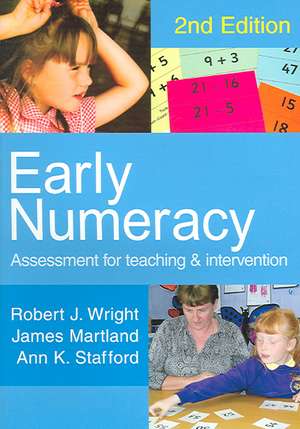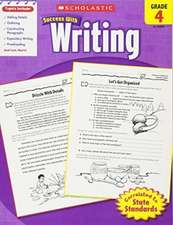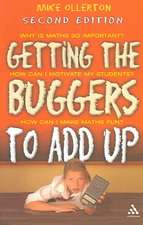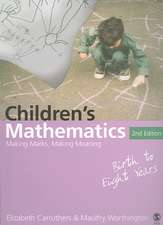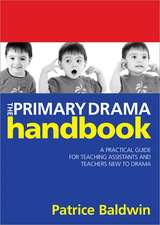Early Numeracy: Assessment for Teaching and Intervention: Math Recovery
Autor Robert J Wright, James Martland, Ann K Stafforden Limba Engleză Paperback – 4 ian 2006
'This is a highly practical resource that will be appreciated by classroom and specialist teachers alike. It will provide teachers new to the Math Recovery program with practical help and support to diagnose errors and misconceptions in early numeracy. Practicing Math Recovery Specialists will be thrilled with the addition of four new highly focused assessments and an elaboration of the Learning Framework in Number.
Early Numeracy is admirably grounded in international research and well-established theory, characteristics that are much sought after in the current data driven educational environment.
Like many others, I was drawn to Math Recovery after reading the first edition of Early Numeracy. This second edition is a treasure - it is exciting to consider the impact it will have on children and teachers, and to the growth of the Math Recovery program' - Audrey Murray, Lead Teacher, Midwest Math Recovery Training Center, Minneapolis
This text has been fully updated to include developments and refinements brought about by widespread international application of the assessment tools in the Mathematics Recovery Programme. The book will help practitioners to identify and provide detailed analyses of all children but especially those who are able and those who underachieve in early numeracy. It will enable teachers, learning support personnel, numeracy consultants and educational psychologists to advise colleagues and parents on children's number knowledge and strategies for early numeracy.
The Mathematics Recovery Programme has been successfully applied in Australia, the United Kingdom and Ireland, the United States and Canada, both in specialist interventions and classroom settings. The revised version shows how familiarisation with, and understanding of, the diagnostic assessment tools has allowed teachers to become more knowledgeable in understanding children's difficulties and misconceptions, and more skilled and confident in planning programmes of intervention and monitoring the children's progress.
This new edition includes:
- Integrated frameworks of useful tasks for assessing children's number knowledge and strategies;
- Four separate and revised diagnostic assessment interviews;
- Assessments for addition and subtraction strategies, Base Ten Arithmetical strategies, Early Grouping strategies, and Advanced Grouping strategies in the four operations;
- How the assessment process has impacted significantly on teachers' professional development and contributed to the raising of standards in early numeracy.
| Toate formatele și edițiile | Preț | Express |
|---|---|---|
| Paperback (1) | 299.12 lei 3-5 săpt. | +22.59 lei 7-13 zile |
| SAGE Publications – 4 ian 2006 | 299.12 lei 3-5 săpt. | +22.59 lei 7-13 zile |
| Hardback (1) | 1003.12 lei 6-8 săpt. | |
| SAGE Publications – 4 ian 2006 | 1003.12 lei 6-8 săpt. |
Preț: 299.12 lei
Nou
57.24€ • 59.76$ • 47.37£
Carte disponibilă
Livrare economică 14-28 martie
Livrare express 28 februarie-06 martie pentru 32.58 lei
Specificații
ISBN-10: 141291020X
Pagini: 224
Ilustrații: illustrations
Dimensiuni: 170 x 242 x 12 mm
Greutate: 0.4 kg
Ediția:Second Edition
Editura: SAGE Publications
Colecția Sage Publications Ltd
Seria Math Recovery
Locul publicării:London, United Kingdom
Recenzii
'This is a highly practical resource that will be appreciated by classroom and specialist teachers alike. It will provide teachers new to the Math Recovery program with practical help and support to diagnose errors and misconceptions in early numeracy. Practicing Math Recovery Specialists will be thrilled with the addition of four new highly focused assessments and an elaboration of the Learning Framework in Number.
Early Numeracy is admirably grounded in international research and well-established theory, characteristics that are much sought after in the current data driven educational environment.
Like many others, I was drawn to Math Recovery after reading the first edition of Early Numeracy. This second edition is a treasure - it is exciting to consider the impact it will have on children and teachers, and to the growth of the Math Recovery program' - Audrey Murray, Lead Teacher, Midwest Math Recovery Training Center, Minneapolis
Cuprins
The Learning Framework in Number
The LFIN and the Assessment Interview Schedule 1.1
The Stages of Early Arithmetical Learning (SEAL)
Identifying the Stages of Early Arithmetical Learning
Assessment Interview Schedule 1.2
Part C of the LFIN: Assessment Interview Schedules 2.1 and 2.2
Assessment Interview Schedules 3.1 and 3.2
Recording, Coding and Analyzing the Assessment Interview Schedules
Linking the Assessment to Teaching
Appendix 1: Assessment Interview Schedule 1.1
Appendix 2: Assessment Interview Schedule 1.2
Appendix 3: Assessment Interview Schedule 2.1
Appendix 4: Assessment Interview Schedule 2.2
Appendix 5: Assessment Interview Schedule 3.1
Appendix 6: Assessment Interview Schedule 3.2
Appendix 7: Learning Framework in Number
Appendix 8: Instructional Framework for Early Number
Appendix 9: Linking the Diagnostic Assessment Interviews to the
Learning Framework in Number
Appendix 10: Required Materials
Appendix 11: The Mathematics Recovery Coding Schedule
Glossary
Notă biografică
Dr Robert J. (Bob) Wright holds Bachelor¿s and Master¿s degrees in mathematics from the University of Queensland (Australia) and a doctoral degree in mathematics education from the University of Georgia. He is an adjunct professor in mathematics education at Southern Cross University in New South Wales. Bob is an internationally recognized leader in assessment and instruction relating to children¿s early arithmetical knowledge and strategies, publishing six books, and many articles and papers in this field. His work over the last 25 years has included the development of the Mathematics Recovery Program, which focuses on providing specialist training for teachers to advance the numeracy levels of young children assessed as low-attainers. In Australia and New Zealand, Ireland, the UK, the USA, Canada, Mexico, South Africa and elsewhere, this programme has been implemented widely, and applied extensively to classroom teaching and to average and able learners as well as low-attainers. Bob has conducted several research projects funded by the Australian Research Council including the most recent project focusing on assessment and intervention in the early arithmetical learning of low-attaining 8- to 10-year-olds.
